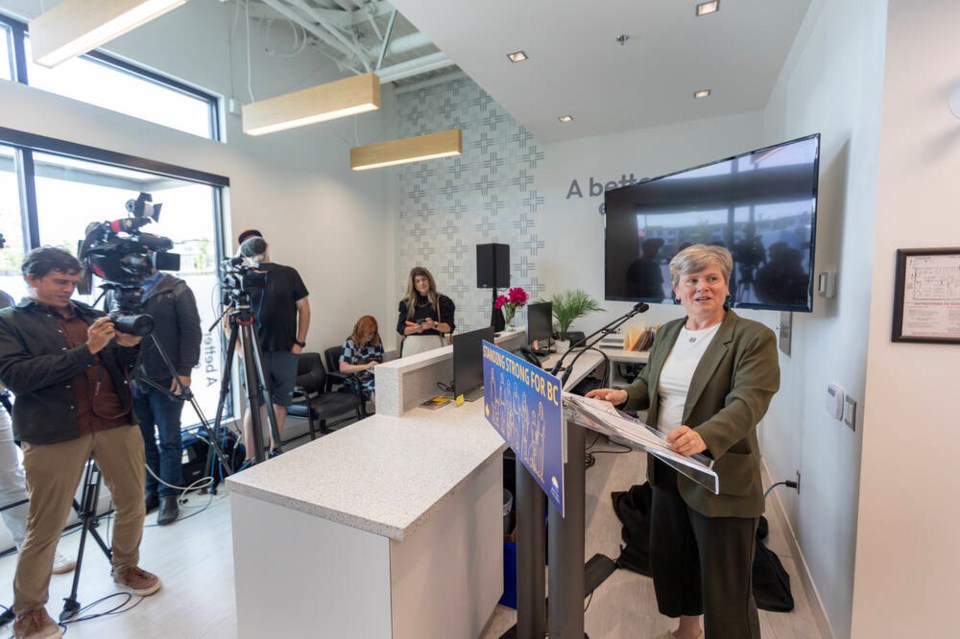B.C. has launched an advertising campaign in Washington, Oregon and California to attract health-care professionals who want to move to Canada to work, the province announced Friday.
The ad campaign was unveiled at the municipally run Colwood Medical Clinic in Colwood Commons, where Dr. Muthanna Yacoub, a physician who has been practising in the United States, is planning to start working this year.
Yacoub is one of 704 physicians and 525 nurses from the U.S. who have expressed interest in working in B.C. since the province’s targeted recruitment campaign began in March.
“The opportunity to practise in British Columbia makes perfect sense to me,” said Yacoub in a statement, expressing concern that in the U.S, providing appropriate care is often measured against patients’ ability to afford it.
B.C. Health Minister Josie Osborne said at the news conference Friday that economic uncertainty in the U.S., as well as cuts to health care and science and attacks on reproductive rights, are causing many health-care workers to look north.
“In B.C. they see a universal health-care system rooted in evidence-based care and compassion,” she said. “They see inclusive communities where diversity is a strength and everyone belongs.”
The province’s six-week ad campaign, which launched on June 2, includes video, audio, digital, social media, print and ads in public places, such as digital billboards.
One ad says: “If you’re looking for a place that values evidence-based care and puts people first, follow your heart to British Columbia, Canada.”
Another promotes Canada’s universal health-care system, while yet another starts with a gloomy “more news from Washington today” introduction followed by talk of welcoming communities, quality of care and quality of life.
The “follow your heart” tag line runs through all the ads, which have been targeted to run within 10 miles of health-care facilities, according to the province.
Locations include restaurants, grocery stores, ride-share screens, billboards, transit shelters and stand-up-panels in city squares.
Dr. Joss Reimer, president of the Canadian Medical Association, said last month that growing frustration with private insurers and concerns about political interference in their practices are prompting American doctors’ interest in moving to Canada.
B.C. Premier David Eby said at the time that uncertainty created by U.S. President Donald Trump and his administration has given the province an opportunity to recruit much-needed doctors and nurses.
Asked if the province can match compensation levels for physicians and nurses in the U.S., Eby said the province is highlighting the lifestyle available in B.C.
The province is also placing ads in six popular medical trade publications in hopes of reaching 80 per cent of health-care professionals in the targeted areas.
In April, the College of Nurses and Midwives streamlined the application process so U.S. nurses can be registered in just a few days, compared to the previous average of four months. Once registered, a nurse is licensed to work in B.C.
Under the initiative, American nurses can apply directly to the college without first going through a third-party assessment organization. The college can also access a database to review the education, exam results, employment and registration history of nurses who apply.
Last month, Eby said 177 nurses had applied and 113 had been registered with the B.C. College of Nurses and Midwives.
One nurse from Texas who was pursuing registration in B.C. after touring Nanaimo Regional General Hospital spoke at the news conference but acknowledged that pulling up stakes to work in B.C. — with kids in school and her partner, a nurse, also working in the U.S. — is complicated.
Osborne has said while there’s no guarantee nurses registered to work in B.C. will actually move to the province, applicants are being given information on how to take the plunge, with a “step by step” guide to credentialing and immigration.
Osborne said the biggest gaps to fill for health-care workers are in rural and remote communities, emergency departments and cancer care. The primary and long-term-care systems are also in need.
The province is working with the College of Physicians and Surgeons of B.C. to implement bylaw changes that will allow U.S. doctors certified by American Board of Medical Specialties to apply directly to become fully licensed in B.C., without the need for further licensing examinations, but has yet to update progress on that front.
Similar changes were recently made in Ontario, Nova Scotia and New Brunswick.



